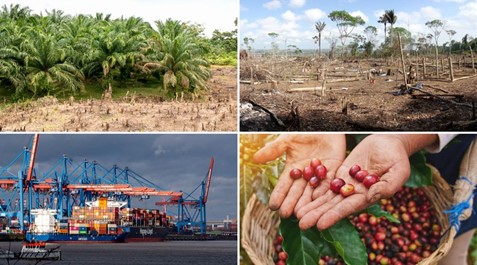Expertise
New EU regulation for deforestation-free products replaces EUTR
Margret Köthke | 29.11.2023
The new EU regulation to curb trade in products linked to deforestation, forest degradation and illegality (in short: EUDR) was adopted in May 2023 and has to be implemented from December 30, 2024.

The EU has adopted the Regulation on Deforestation-free Products (EUDR) to reduce its contribution to global deforestation and forest degradation. This regulation bans certain products on the EU market if the raw materials used are associated with deforestation risks. Products made from the raw materials coffee, cocoa, soy, oil palm, cattle, rubber and wood are affected. According to the regulation, only products that are deforestation-free and legal under the legislation of the producing countries are compliant. The EUDR will replace the EU Timber Regulation (EUTR), which only covers the illegality of timber products. The EUDR concept adopts the basic approach of the EUTR, but aims to eliminate weaknesses that have so far left loopholes for non-compliant companies.
The Thünen Institute compared the provisions of the EU Timber Regulation (EUTR) and the new EU Regulation on deforestation-free products (EUDR) and examined whether and how the weaknesses of the EUTR have been remedied by the successor regulation. The effects on companies in the timber sector and the control authorities in the EU were examined. It was found that the EUDR closes some important loopholes that existed in the EUTR. This is mainly due to three elements:
- the introduction of mandatory digital registration combined with control possibilities for customs authorities;
- the increase in liability obligations in EU domestic trade;
- and the reduction of the leeway for EU Member States in the design of national legislation and enforcement.
However, the EUDR creates considerable additional burdens for companies and control authorities. This is due to both significantly extended reporting obligations and an enormous expansion of the scope of application. It remains to be seen how strongly the EUDR will affect the procurement costs of EU companies and, as a result, their product prices - and to what extent this may trigger trade shifts in favor of less regulated countries.
In addition to the wood products already covered by the EUTR, the EUDR affects other wood products such as printed paper products, chairs and charcoal. While the EUTR only covered 87 % of imports of wood-based products from third countries into the EU (based on the year 2020 and roundwood equivalents), the EUDR covers 93% of imports in the same period. Recycled products, such as recovered paper, are still explicitly not affected.
Transitional provisions for certain products
While the provisions of the EUDR must be implemented from December 30, 2024, special transitional rules apply to products previously affected by the EUTR. For EUTR products produced before June 29, 2023 and placed on the market from December 30, 2024, the EUTR will continue to apply until December 31, 2027. For EUTR products produced before June 29, 2023 and placed on the market from December 31, 2027, the new EUDR will apply.
Under the EUTR, each EU Member State is only responsible for checking the first placing on the market of a product within its national borders. Only companies that place products on the market for the first time are subject to due diligence and are therefore liable. According to the EUTR, the first placing of a product on the EU market refers both to the import of relevant products from third countries (imports) and to the placing of domestically produced timber on the EU market. However, once a product is on the EU market, it can continue to be traded within the EU under the EUTR without due diligence.
The EUDR extends the scope of the affected trade transactions. Due diligence is required for imports and exports as well as for all trade transactions within the EU internal market that are part of a commercial activity. This means that all trading actors along the supply chain within the EU borders must comply with the due diligence obligation.

![[Translate to English:] Logo des Bundesministerium für Ernährung und Landwirtschaft](/media/allgemein/logos/BMEL_Logo.svg)